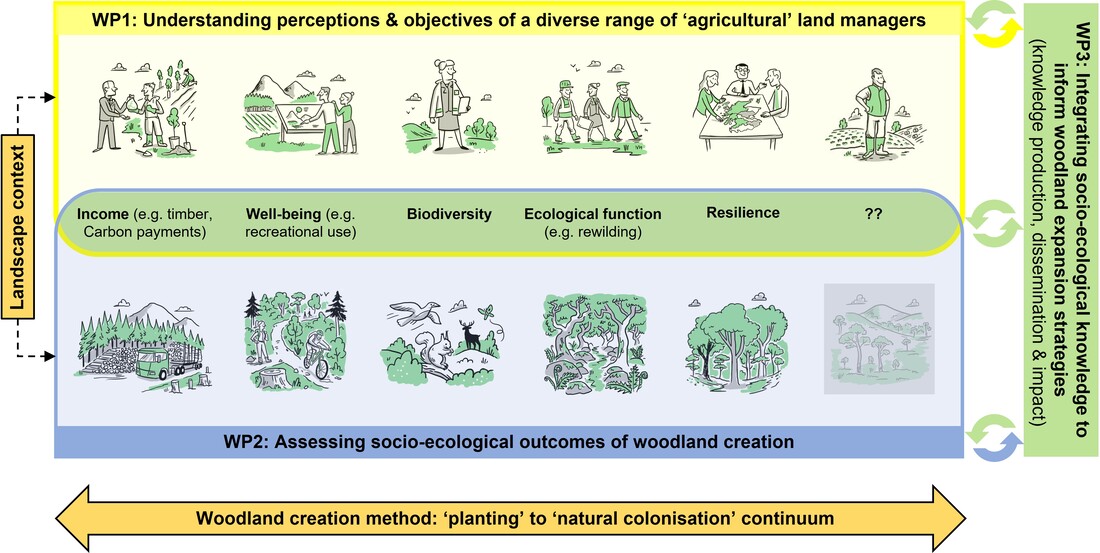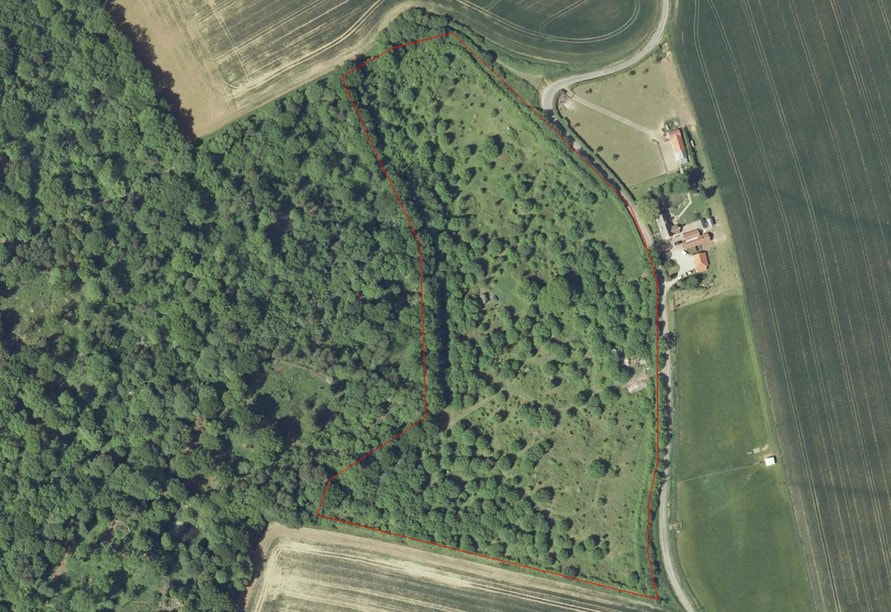Project summary
Tree planting has been the most common woodland expansion strategy in the UK for many decades. Although this approach has many benefits, its success is often overestimated, and it will be challenging to scale-up tree planting at the level required to meet ambitious government woodland expansion targets. There is now growing interest in incorporating ‘natural colonisation’ into woodland creation strategies: allowing tree seedlings to colonise new areas naturally, either alone, or in combination with tree planting.
Naturally colonised woodlands have the potential to be more structurally diverse, ecologically complex and resilient than planted sites. However, the success and timeframe for natural colonisation to create a woodland habitat is highly variable, and can depend on many factors (e.g. nearby seed sources, herbivore pressure, existing habitat type). As the outcome of using natural colonisation to create woodland is not guaranteed, land managers are likely to differ in their perspectives on how it might be incorporated into woodland expansion strategies. Yet, there could be potential for natural colonisation to unlock woodland expansion at scale across the UK.
In this interdisciplinary project (funded by UKRI through their Treescapes programme) we will explore the attitudes of a diverse range of land managers towards woodland creation strategies spanning the planting to natural colonisation continuum. We will also quantify the differing ecological and social consequences of these approaches, and identify factors associated with woodland resilience. Finally, we will integrate our socio-ecological findings to demonstrate how tree planting and natural colonisation can be used in combination to scale-up woodland expansion for a range of objectives on agricultural land.
Watch the introductory video about the project here.
Tree planting has been the most common woodland expansion strategy in the UK for many decades. Although this approach has many benefits, its success is often overestimated, and it will be challenging to scale-up tree planting at the level required to meet ambitious government woodland expansion targets. There is now growing interest in incorporating ‘natural colonisation’ into woodland creation strategies: allowing tree seedlings to colonise new areas naturally, either alone, or in combination with tree planting.
Naturally colonised woodlands have the potential to be more structurally diverse, ecologically complex and resilient than planted sites. However, the success and timeframe for natural colonisation to create a woodland habitat is highly variable, and can depend on many factors (e.g. nearby seed sources, herbivore pressure, existing habitat type). As the outcome of using natural colonisation to create woodland is not guaranteed, land managers are likely to differ in their perspectives on how it might be incorporated into woodland expansion strategies. Yet, there could be potential for natural colonisation to unlock woodland expansion at scale across the UK.
In this interdisciplinary project (funded by UKRI through their Treescapes programme) we will explore the attitudes of a diverse range of land managers towards woodland creation strategies spanning the planting to natural colonisation continuum. We will also quantify the differing ecological and social consequences of these approaches, and identify factors associated with woodland resilience. Finally, we will integrate our socio-ecological findings to demonstrate how tree planting and natural colonisation can be used in combination to scale-up woodland expansion for a range of objectives on agricultural land.
Watch the introductory video about the project here.

Overview of work planned for the TreE_PlaNat project, including work packages (WPs). Social science WP1 (yellow) focuses on understanding the perceptions of a diversity of agricultural land managers for a range of objectives; ecology WP2 (blue) assesses the outcomes of such woodland creation approaches; inter-disciplinary WP3 (green) integrates knowledge derived from WP1 & 2 with the aim to influence land managers’ engagement with woodland creation through a combination of planting and natural colonisation
Project team
Principal Investigator
Dr Elisa Fuentes-Montemayor, University of Stirling
Social Science - Work Package 1
Dr Bianca Ambrose-Oji, Forest Research
Dr Maddy Pearson, Forest Research
Rachel Orchard, Forest Research
Ecology Work - Package 2
Prof Kirsty Park, University of Stirling
Dr Thiago Silva, University of Stirling
Prof Kevin Watts, Forest Research & University of Stirling
Dr Laura Braunholtz, University of Stirling
Prof Julia Koricheva, Royal Holloway University of London
Knowledge Exchange and Synthesis - Work Package 3
Prof Marc Metzger, University of Edinburgh
Dr Susannah Fleiss, University of Edinburgh
Project Partners
Dr Vanessa Burton, The Woodland Trust
Dr Heather Gilbert, The National Forest Company
Principal Investigator
Dr Elisa Fuentes-Montemayor, University of Stirling
Social Science - Work Package 1
Dr Bianca Ambrose-Oji, Forest Research
Dr Maddy Pearson, Forest Research
Rachel Orchard, Forest Research
Ecology Work - Package 2
Prof Kirsty Park, University of Stirling
Dr Thiago Silva, University of Stirling
Prof Kevin Watts, Forest Research & University of Stirling
Dr Laura Braunholtz, University of Stirling
Prof Julia Koricheva, Royal Holloway University of London
Knowledge Exchange and Synthesis - Work Package 3
Prof Marc Metzger, University of Edinburgh
Dr Susannah Fleiss, University of Edinburgh
Project Partners
Dr Vanessa Burton, The Woodland Trust
Dr Heather Gilbert, The National Forest Company
Other contributors
We have committed support from NatureScot, Forestry Commission UK, LEAF, Natural England and Tarmac. There is also a Project Advisory Group that meets biannually, and a Knowledge User Board of land managers, both of which comprise a range of individuals from relevant governmental, non-profit and private organisations.
We have committed support from NatureScot, Forestry Commission UK, LEAF, Natural England and Tarmac. There is also a Project Advisory Group that meets biannually, and a Knowledge User Board of land managers, both of which comprise a range of individuals from relevant governmental, non-profit and private organisations.
Contact
For general enquiries, please contact Elisa Fuentes Montemayor, project principal investigator.
For knowledge exchange enquiries, please contact Susannah Fleiss.
For general enquiries, please contact Elisa Fuentes Montemayor, project principal investigator.
For knowledge exchange enquiries, please contact Susannah Fleiss.
|
Follow us on Twitter @natcolonisation
|

